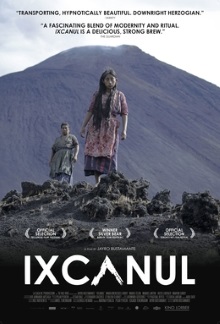
This film made it onto the lists of many critics’ best films of 2016 though it actually made its debut at a film festival in early 2015. It has a 100% rating on Rotten Tomatoes and boasts of being the only film ever made in the Kaqchikel language, apparently a branch of the Mayan family of languages that is spoken in Guatemala. Needless to say I watched this with a fair bit of anticipation.
Maria is a young girl who lives with her parents on the slopes of a volcano. They and everyone else nearby work in a coffee plantation. Her parents arrange for her to be married to Ignacio, who seems to be the foreman of the plantation but Maria has a boyfriend, Pepe, who is a laborer. Pepe talks to her about travelling behind the volcano and crossing a desert to enter the United States and Maria begs him to take her together. She eventually acquiesces to his demands for sex but no one will be surprised to learn that at the end of the harvest he takes off on his own without telling anyone. Inevitably, she becomes pregnant and her mother tries various methods to abort it at home. The family’s problems are further compounded when they realize that the land they are supposed to cultivate is infested with snakes. Since it is no longer possible for Maria to marry Ignacio and they cannot work the land, they fear being evicted from their shack.
My wife didn’t like this too much as its plot is thoroughly conventional and there is little about the lifestyle of the Kaqchikel people that distinguishes it from other Native American cultures. For my part, the straightforwardness and honesty of the film adds to its authenticity and is enough to make it feel powerful. It makes sense to think of this as more of a documentary of the living conditions of this people, touching as it does on marriage rituals, traditional beliefs and even how the young men spend all of their money on alcohol. That the cast seems to be made up of non-professionals and have relatively subdued emotional affect also makes it feel more real. The cinematography isn’t showily spectacular either but it captures the weight of the volcano that constantly hangs over everyone.
On another level, I also find it rather cool to think of this as being a feminist film. At its heart, this is after all a film about teen pregnancy and how to deal with it. The most powerful figure in the film is Maria’s mother who predictably berates her for trusting Pepe but in the end there is no doubt that she loves her daughter. She’s the one who tries to find a solution for her daughter’s problems, commenting to her husband, “as usual” and fights for her, even attempting to drive out the snakes from their patch of land on her own so that their family can continue to stay there. That’s a textbook example of female empowerment in what is for most of us a very exotic milieu.
I wouldn’t say that this is a great film. It’s far too simple and too unambitious for that. But there’s no doubt that this is a fantastic debut effort by director Jayro Bustamante and it’s great to see a film about a little known people to capture the world’s attention like this.